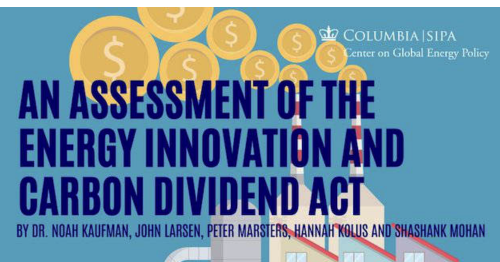Columbia University Economists Publish Energy Innovation Act Study
 WASHINGTON, D.C., NOV. 6, 2019 — A group of five economists from Columbia University’s Center on Global Energy Policy has published “An Assessment of the Energy Innovation and Carbon Dividend Act.” This study offers an up-to-date, independent assessment of the Energy Innovation Act’s impacts on emissions, air pollution, and Americans’ finances.
WASHINGTON, D.C., NOV. 6, 2019 — A group of five economists from Columbia University’s Center on Global Energy Policy has published “An Assessment of the Energy Innovation and Carbon Dividend Act.” This study offers an up-to-date, independent assessment of the Energy Innovation Act’s impacts on emissions, air pollution, and Americans’ finances.
“We’re encouraged that economists from Columbia’s prestigious Center on Global Energy Policy have assessed this policy and found it to have such positive impacts,” said Dr. Danny Richter, CCL’s Vice President of Government Affairs. “We hope that their findings inspire more members of Congress to join the 69 representatives who already support this bill.”
The study’s key findings include:
- Substantial emissions reductions. The authors conservatively estimate the Energy Innovation Act to drive 36% to 38% emissions reductions by 2030. These “exceed the U.S. commitments to the Paris Agreement over this period,” the authors state.
- Cleaner air. The study finds that, under the Energy Innovation Act, sulfur dioxide and mercury emissions from the power sector will decline by more than 95%, and nitrous oxide emissions will decline by about 75% by 2030. The authors point out, “As lower-income and minority households suffer disproportionately from the impact of air pollutants, they are likely to benefit disproportionately from pollution mitigation.”
- Financial benefits. The Energy Innovation Act will generate “substantial revenue” that is allocated to Americans as a carbon dividend each month. The authors estimate that in the first year of the policy, an American adult will receive $250-$260 total, and that would rise to $1,410-$1,470 by 2030. The study explains, “On average, the carbon dividend payments are comparable to the changes in energy expenditures” caused by the policy. Specifically, “average low- and middle-income households receive more in dividends than they pay in increased economy-wide prices.”
The assessment also reiterates that “economists almost universally support putting a price on carbon” because it is “a uniquely cost-effective policy tool.”
Dr. Noah Kaufman, one of the study’s authors, said, “It’s no secret that a price on carbon is a critical part of low-cost climate change strategy, but crafting carbon tax legislation requires policymakers to make a host of difficult choices. We hope our studies enable a better understanding of the benefits and trade-offs of different policy design options.”
To find out more, join Dr. Kaufman and Jerry Hinkle, CCL Research Coordinator, for a live webinar (log-in info here) discussing the recently released assessment on Thursday, November 14th at 8:00 pm ET.
Recent Posts
